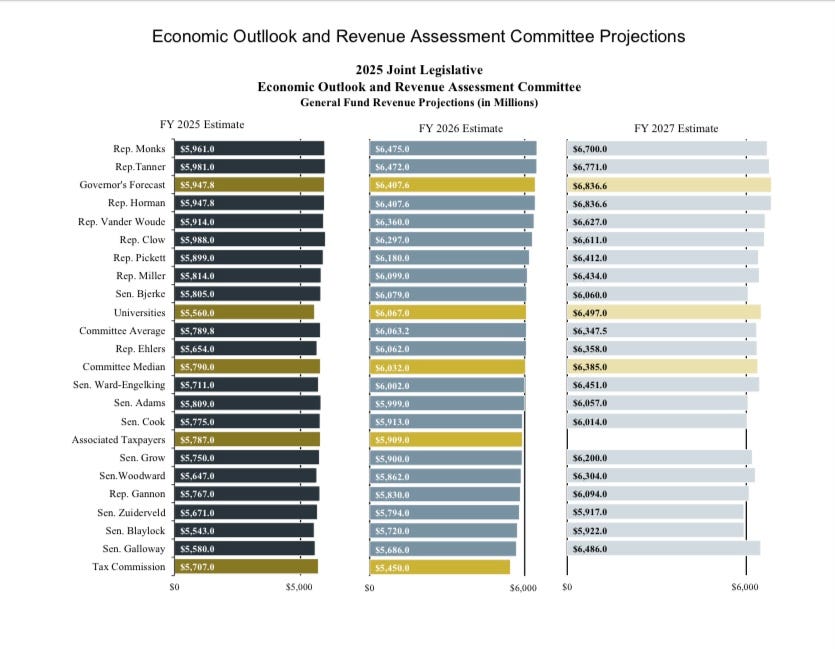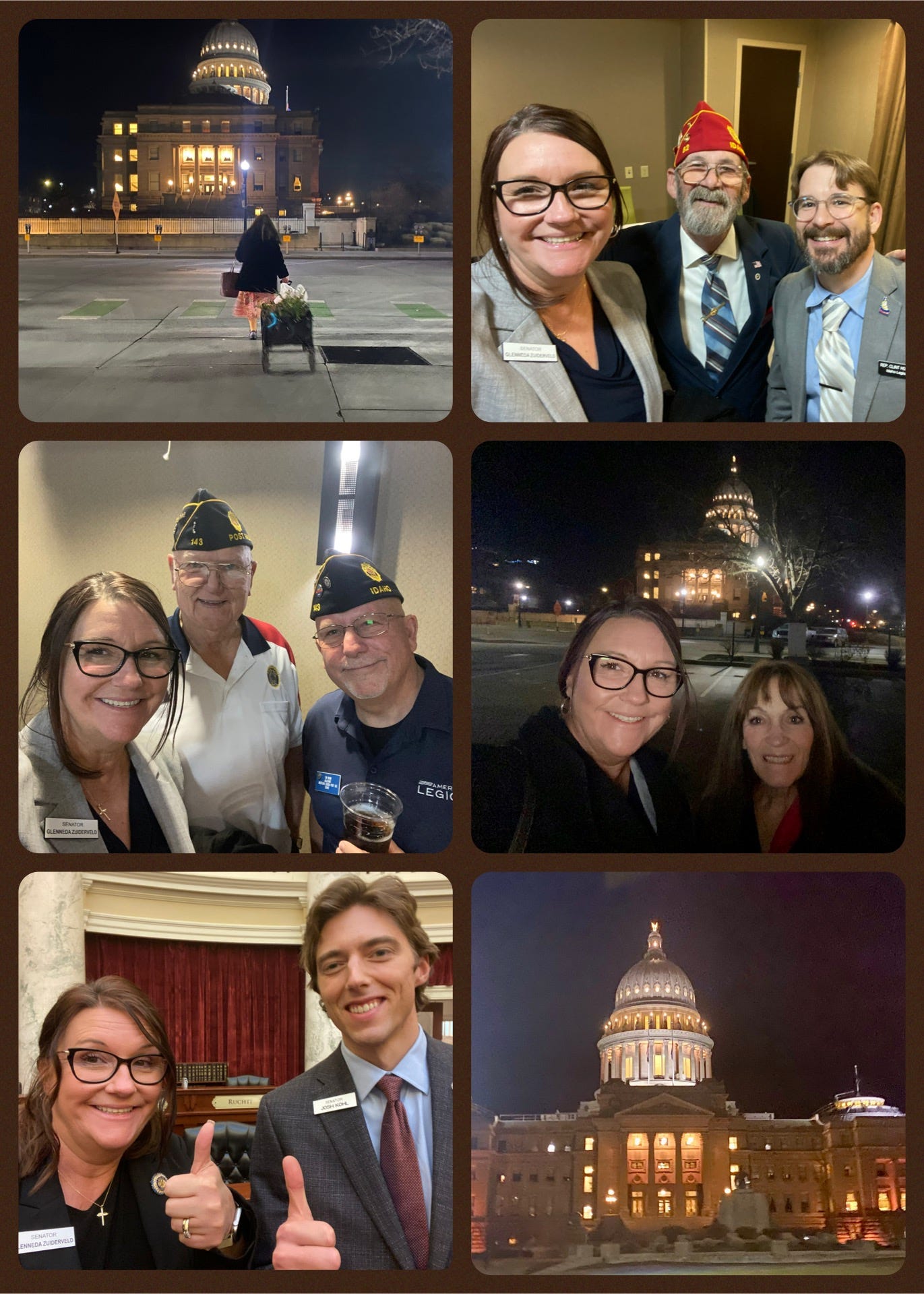68th Legislative Term Begins
Week One…Budgets, Regulations and AI, OH MY!
WOWZA, what a week!
We kicked things off with Governor Little's State of the State address to the legislature. I had the honor of being chosen, along with Senator Grow and Senator Ward-Engleking, to let the Governor know that the Senate is ready to begin the 68th Legislative Term.
The Governor joked, advising legislators not to hydrate too much because it was going to be a long speech. I was prepared for another lengthy address, possibly with a video like last year’s State of the State. However, after a brief 15-minute speech, I realized his comment was pure sarcasm.
Despite its brevity, the speech was packed with substance. Here's a debrief on his key talking points, summarized by eight of your legislators. (READ HERE)
My session actually began the week before with the Economic Outlook Forecast Committee. We listened to several presentations on the economic outlook from various economists representing organizations such as Zions Bank, the Governor's Office, Idaho Power, and the Idaho State Tax Commission, to name a few.
Our task was to analyze their forecasts and develop our own predictions based on the data and insights they presented. We were informed that while Idaho's state revenues remain strong, the federal government's situation is dire. As many of you know, the largest expense our nation pays is the interest on its debt.
This raises a critical question: Is Idaho strong enough to withstand the ripple effects of a sinking federal debt? The committee voted on a state revenue forecast of $5.9 billion, yet our bills are projected to total $14 billion. Alarmingly, 40% of our expenditures are funded by federal dollars—dollars derived from debt.
Your legislators face some very challenging decisions ahead
The Joint Finance-Appropriations Committee (JFAC) has been meeting all week, providing us with a 50,000-foot overview of the areas we’ll be delving into more deeply in the days ahead.
I will be serving on the Health and Welfare and Natural Resources workgroups, but all of us will be voting on over 100 budget bills, both in committee and on the Senate floor.
If you’re interested in exploring Idaho’s legislative budget book, (CLICK HERE)
My other committee is Health and Welfare. We met briefly to make introductions and prepare for reviewing rules and regulations starting next Tuesday. This is a very important part of our work.
While it may sound great to say we are the least regulated state due to the removal of so many rules, the reality is more complex. Not all rules are eliminated—many are simply relocated. If we’re not vigilant, there’s a risk that new rules could be added without going through the legislative process, or that federal rules and regulations could be incorporated without proper oversight. (RULES AND REGULATIONS)
Several bills and resolutions have been introduced, and you can read them (HERE). I am only sponsoring a few this session due to my heavy workload.
The Grocery Tax bill, which I am sponsoring alongside Senator Kohl, Representative Leavitt, and Representative Cayler, will hopefully be heard in the House Revenue and Taxation Committee. We should know more by early next week.
Additionally, the Ten Commandments bill is nearly ready. My dear friend and former Representative Jacyn Gallagher has been doing incredible work on this initiative. There is also a bill in progress that would allow Bible verses to be read in schools as part of teaching our nation's history—I’ll keep you updated on its status.
Finally, a resolution to reduce our legislative pay increase from 22% to 2.5%, carried by Senator Zito and co-signed by 10 of us so far, is expected to be heard in the State Affairs Committee next week.
What are your thoughts on using AI to read and analyze bills, rules, and regulations? Mountain States Policy has introduced an AI app called (WONK) to help with reading bills and providing bullet-point summaries. Additionally, many people are using tools like ChatGPT.
At this point, I have mixed feelings about this. One concern I have is why we would rely on an unknown AI program instead of a trusted think tank like the Idaho Freedom Foundation. They’ve been analyzing bills for over a decade, and they are men and women we know—people we can have meaningful dialogue with, who live in our state, and who deeply care about it.
I’d love to hear your thoughts on this.
Here are some of my personal thoughts and observations so far.
As we enter this session, you’ll see a great deal of what I call "confrontational and access politics." These tactics are nothing new—they’ve always been used by various groups. Some receive more attention than others, but I’ve experienced it from organizations like IACI to school unions and everything in between.
We were fully aware of this when we signed our campaign disclosure forms. We knew we would face confrontations on many fronts. If someone didn’t consider this reality before deciding to run for office, they may find themselves blindsided by it all.
At its core, there are only two sides in this fight: the side of big government and the side of the people. We must choose one. I stand with the people. Like many of you, I have felt frustration with elected officials and the oppressive policies and decisions that have come from their offices.
I work hard to block out the noise of negative ads and social media posts about me, focusing instead on serving my district and my constituents. One unexpected blessing of these confrontational tactics is that they have engaged many people who were previously uninvolved in politics. This has allowed me to build new relationships and have meaningful conversations with those who now want to understand the process better. I’ve shared my experiences, educated them, and guided them to resources where they can find the truth for themselves.
I always say, if we can’t take the heat, we need to vacate the seat. I will always prioritize policy over personality. It doesn’t matter whose name is on a bill; this isn’t a game, and it isn’t high school. We were sent here to do a job and fight for our people—and that’s exactly what I intend to do.
As I head into my third session, I’ve realized that I’ve neglected to take photos as I did during my freshman year. It’s a bit like parenting—taking countless pictures of the first child, only for it to gradually taper off by the third. It’s a bittersweet reality, but it is reality.
Psalm 119:1-8
Blessed are those whose way is blameless,
who walk in the law of the Lord!
2 Blessed are those who keep his testimonies,
who seek him with their whole heart,
3 who also do no wrong,
but walk in his ways!
4 You have commanded your precepts
to be kept diligently.
5 Oh that my ways may be steadfast
in keeping your statutes!
6 Then I shall not be put to shame,
having my eyes fixed on all your commandments.
7 I will praise you with an upright heart,
when I learn your righteous rules.
8 I will keep your statutes;
do not utterly forsake me!
Prayer Warriors you are needed more than ever to intercede for us. I covet your prayers! I love you!
Pray for…
Discernment and Wisdom
Health of our minds, bodies and souls
Protection against the enemy who looks to kill, steal and destroy
That we will all make time with YHWH and to pray and read His Word
That no root of resentment or hate will fill our hearts
That God will provide a way for us to give some relief to the people




My thoughts on using AI to read legislative bills;
I believe bills should be short, simple and concise. AI would allow the language in a bill to increase in size and complexity, creating even more room to insert unnecessary things and/or things unrelated to the bill.
Also will using AI to read bills lead to AI writing bills?
It seems, to me, to lead into uncharted, dangerous territory.
Our legislative bills need to move more towards simple understandable legislation we can all easily read and understand.
No on using AI for bills. Idaho Freedom Foundation knows our laws, regs and how it works down there. AI doesn’t. I am concerned we are again going to become too dependent upon technology, like we are with our phones and another Twitter or UTube is going to happen where their biases influences our information. In my opinion concerned citizens need to start educating themselves about how the state and federal gov works, it doesn’t seem to be taught anymore in our schools. Our bills should be simple, concise, straightforward with no hidden agenda. Our federal government is in trouble because of omnibus bills full of pork. So let’s do the opposite in Idaho, a common sense state, and use our brains and our eyes and not rely on artificial intelligence.